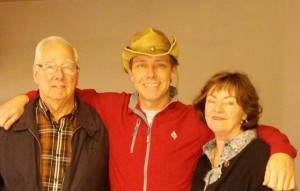For many college students, the biggest challenge they will face in a given semester is a cumulative microeconomics final. For Brian Dungan, his biggest challenge came in the form of a cranial ectomy, a procedure to remove a portion of his brain in an attempt to alleviate epileptic seizures.
When Dungan enrolled at WSU to pursue his bachelor’s degree at age 37, he knew he might be in for a struggle. But the constant headaches and poor concentration due to his epilepsy medication made life unbearable, so when his doctors at Mayo Clinic recommended brain surgery, he agreed.
The surgery was intense and excruciating. During the process half of Dungan’s skull was removed, and he was weaned off his medication as the doctors sought to induce seizures to map their origin. Once the origin was identified, doctors removed a portion of Dungan’s brain with the intent to stop his seizures once and for all.
While recovering from surgery, Dungan stayed motivated by remembering his goal of graduating from WSU. The Eden Prairie native even took a class the semester he underwent the cranial ectomy, and finished the course with an “A.”
“It was quite a long recovery,” Dungan said. “But knowing that I had a goal of getting back to college to finish my degree gave me the determination and strength to get back on my feet.”
Over the following summer, Dungan underwent physical, speech and cognitive therapy while enrolled in a summer term course. The therapy was frustrating and every day was a challenge to his mind and body. But the overall experience has been positive, with Dungan’s quality of life—and his grade point average—improving greatly. He will graduate with a degree in professional studies with a minor in physical science and concentration in history.
“It was an incredibly long road with many obstacles; however, it was worth everything I put into it,” said Dungan.
Dungan’s next challenge is deciding how best to use his degree and his talents. A class he designed during his undergraduate work explored fuel consumption in the U.S. and sparked an interest in corn-based ethanol and biofuels, so he’s considering pursuing a career as a lobbyist for the ethanol industry. But for now he’s grateful to return to his job at Interlachen Country Club in Edina, Minn.
“The management and staff were so welcoming and made it very easy for me to come back to work while I look for a job,” said Dungan. “I can’t thank them enough.”
He is also thankful to the doctors and nurses at Mayo Clinic, his therapists at Winona Clinic, the helpful staff at WSU’s Office of Access Services, and his friends and family who supported him along the way.
“Going back to college was not just a great challenge,” Dungan said, “but one of the most rewarding things I’ve done in my life. I’m so happy I made this decision.”


During this holiday season when we look for guidance and iinspiration, This was an uplifting story.It helped me put down my personal inequities. God bless this mans challenges and how he responded to them.